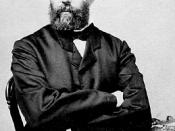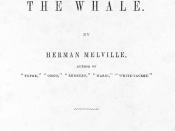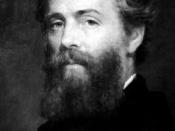Fate, as defined in the dictionary, is "power believed to control all events in a way that cannot be resisted", and plays a significant part in Nathaniel Hawthorne's "An Ambitious Guest" and in Herman Melville's Moby Dick. It is known by many that Hawthorne and Melville are not only contemporaries but also close friends for some years, so it is not surprising to find they hold similar opinions about fate. The idea of fate is presented in both of the two novels in a mysterious way: beyond chance and personal control, fate is such an irresistible force that all characters, ambitious or not, cannot escape their own predestined endings.
In Hawthorne's "An Ambitious guest", ideas about the irresistible force of fate are shown through the unexpected young traveler's delay at the family's house, through the many opportunities that they lose, and the final choice they make to run away from the house.
From the moment the young man entered the house, his mishap began without knowing by himself. The warmth of the fire and the pleasant family circle made him to "pour out his heart" to talk all about his ambitions to be famous and remembered. He could not have stayed there though, it is fate that made his delay a tragedy. The family, too, had many chances to leave the place before the disaster, but when the younger boy told them that his wish was to take a drink out of the basin of the Flume, the whole family just found the idea lovable and silly. The last and most impressing part of the story is when the slide came, all of them ran out to seek a place they deemed as safe, but it turned out that their house was the safest. Mentioned several times, fate or...


